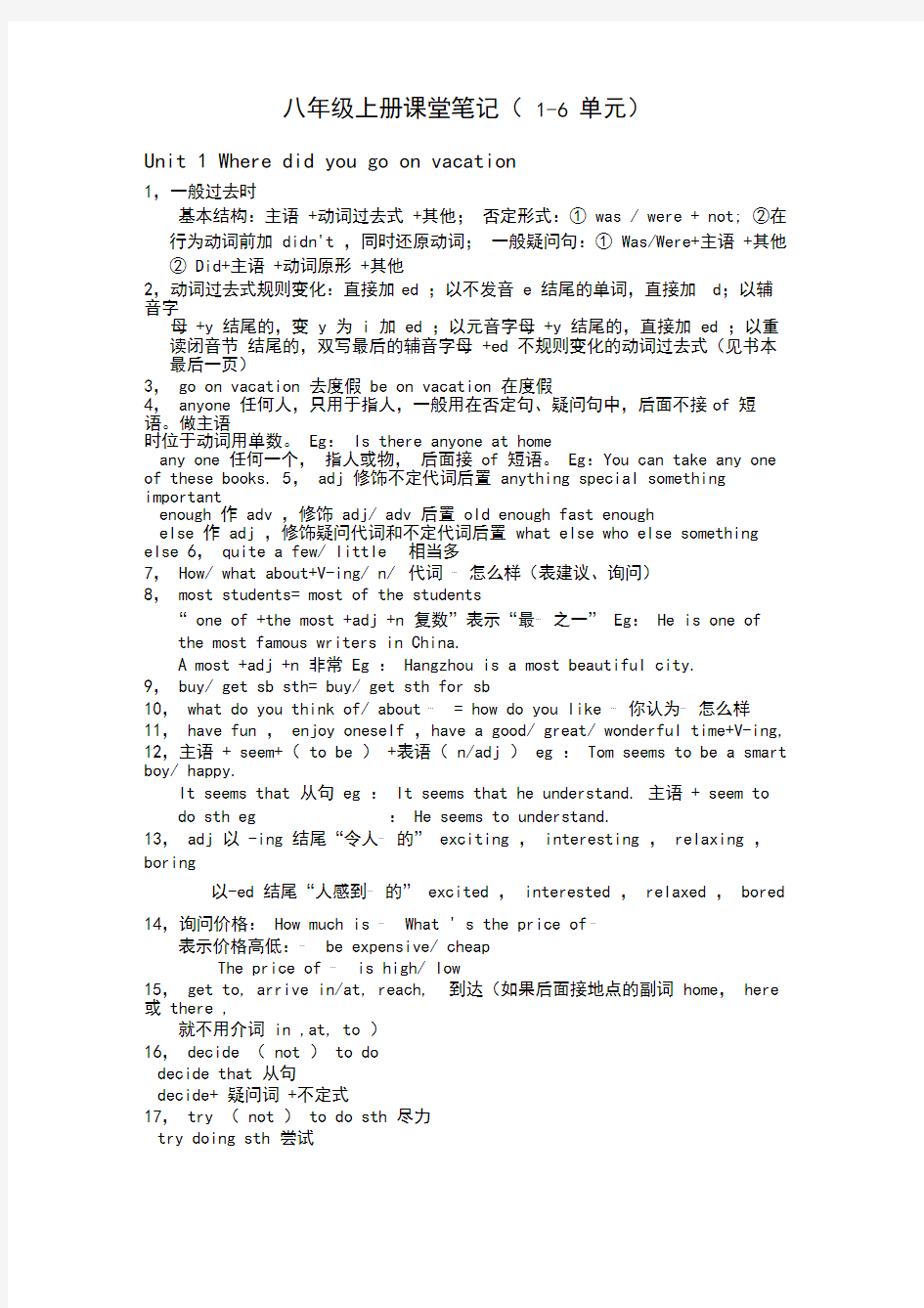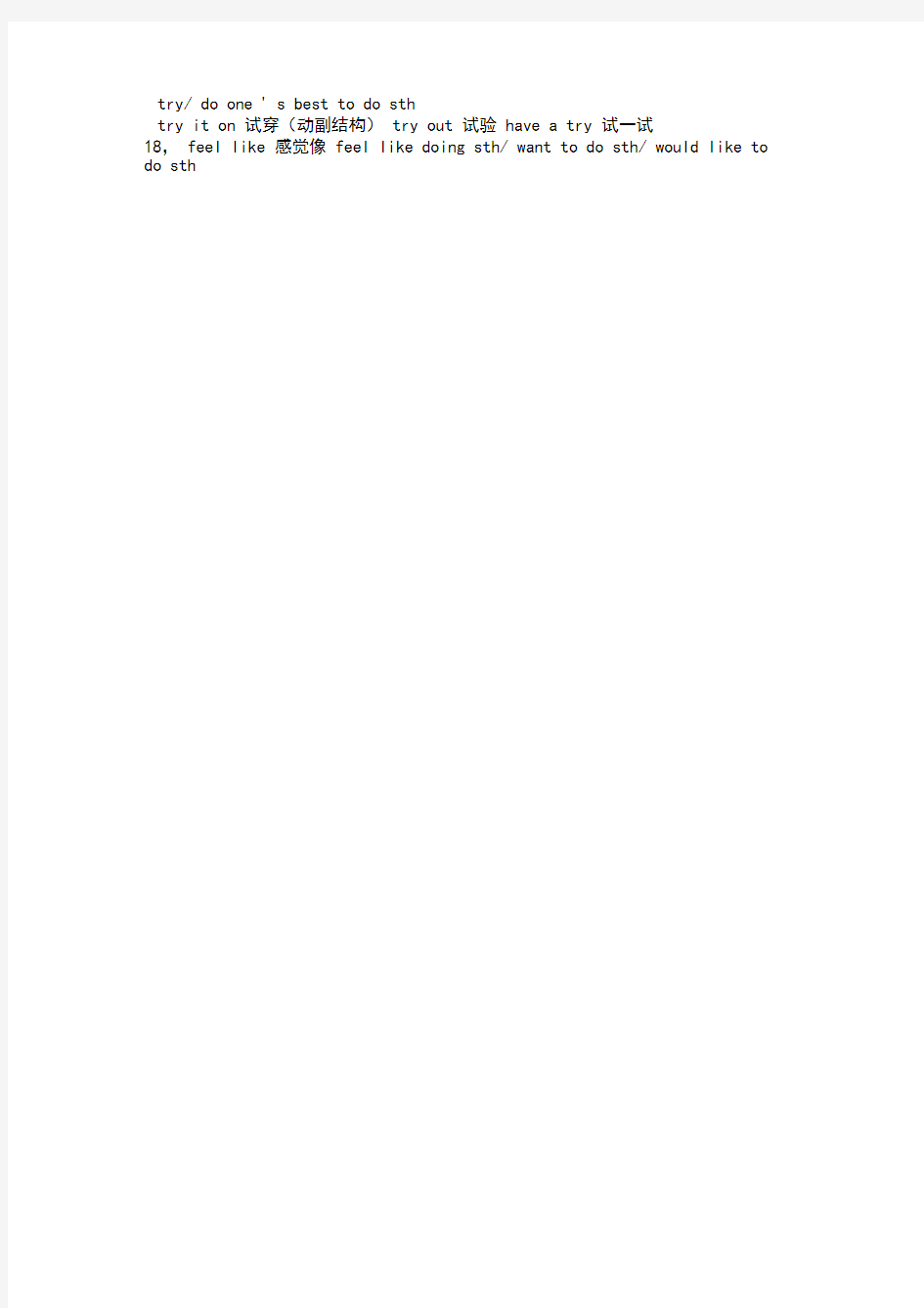八年级上册英语课堂笔记


八年级上册课堂笔记(1-6 单元)
Unit 1 Where did you go on vacation
1,一般过去时
基本结构:主语 +动词过去式 +其他;否定形式:① was / were + not; ②在行为动词前加 didn't ,同时还原动词;一般疑问句:① Was/Were+主语 +其他
② Did+主语 +动词原形 +其他
2,动词过去式规则变化:直接加ed ;以不发音 e 结尾的单词,直接加d;以辅
音字
母 +y 结尾的,变 y 为 i 加 ed ;以元音字母 +y 结尾的,直接加 ed ;以重读闭音节结尾的,双写最后的辅音字母 +ed 不规则变化的动词过去式(见书本最后一页)
3, go on vacation 去度假 be on vacation 在度假
4, anyone 任何人,只用于指人,一般用在否定句、疑问句中,后面不接of 短
语。做主语
时位于动词用单数。 Eg: Is there anyone at home
any one 任何一个,指人或物,后面接 of 短语。 Eg:You can take any one of these books. 5, adj 修饰不定代词后置 anything special something important
enough 作 adv ,修饰 adj/ adv 后置 old enough fast enough
else 作 adj ,修饰疑问代词和不定代词后置 what else who else something else 6, quite a few/ little 相当多
7, How/ what about+V-ing/ n/ 代词?怎么样(表建议、询问)
8, most students= most of the students
“ one of +the most +adj +n 复数”表示“最?之一” Eg: He is one of the most famous writers in China.
A most +adj +n 非常 Eg : Hangzhou is a most beautiful city.
9, buy/ get sb sth= buy/ get sth for sb
10, what do you think of/ about ? = how do you like ?你认为?怎么样
11, have fun , enjoy oneself ,have a good/ great/ wonderful time+V-ing, 12,主语 + seem+( to be ) +表语( n/adj ) eg : Tom seems to be a smart boy/ happy.
It seems that 从句 eg : It seems that he understand. 主语 + seem to do sth eg : He seems to understand.
13, adj 以 -ing 结尾“令人?的” exciting , interesting , relaxing ,boring
以-ed 结尾“人感到?的” excited , interested , relaxed , bored
14,询问价格: How much is ? What ' s the price of ?
表示价格高低:? be expensive/ cheap
The price of ? is high/ low
15, get to, arrive in/at, reach, 到达(如果后面接地点的副词 home, here 或 there ,
就不用介词 in ,at, to )
16, decide ( not ) to do
decide that 从句
decide+ 疑问词 +不定式
17, try ( not ) to do sth 尽力
try doing sth 尝试
try/ do one ' s best to do sth
try it on 试穿(动副结构) try out 试验 have a try 试一试
18, feel like 感觉像 feel like doing sth/ want to do sth/ would like to do sth
19, a lot of= lots of
=plenty of 20, in the past 在过去
21,
22, 23,
24, 25, enjoy/ like doing 感叹句: How+adj+主谓! How+adj+a/an +n What+ a/an +adj+ n What+ adj+ n more than=over 超过
wait for 单+主谓! 单+
主谓! 复 / 不
可数 +主谓!
less than 少于 more or less 或多或
少
too many too much 等待 “太多”修饰可数名词复
数 “太多”修饰不可数
名词 “实在太”修饰形容词或副词 much too because+ 从句 because of +n/ V-ing / enough 作 adj 修饰 n , enough time have enough ? to do sth eg :I have enough time to finish
enough 作 adv 修饰 adj/ adv old enough fast enough
26, 27, 代
词
enough money ?enough for sb to do sth eg : The job is easy
enough for not ? enough to do The book isn ' t easy enough
for me to read.
too ? to ? The book is too difficult for me to read.
so ? that ? The book is so difficult that I can ' t read.
28, the next day 第二天 29, remember/ forget+to do 要做
+doing 做过
30, Stop sb from doing sth 阻止
Stop to do 停下来去做其他事
Stop doing 停止正在做的事 31, another two hours=two more hours
32, at the top of 在?顶端,名列?之前 强调点
on the top of 在?上面 强调面 33, find out 查明,弄清 find 找到(结果) look for 寻找(过程)
34, go on with/ doing sth 继续原来的事
go on to do sth 继续做别的事
35, so +adj +that + 结果状语从句“如此??以致??”
eg : I was so busy that I didn ' t go to sleep for 3 days.
so that 引导目的状语从句,以便,为了( in order to ) eg :
they got up early so that they could catch the early bus.
so +adj + ( a/ an+n 单数) that It is so important a meeting
that I can it.
such+ a/ an+ adj + n 单数 +that It is such an important meeting that I can the work. me to do. t miss 't miss it. such+ adj+n 复数 / 不可数
+that
Unit 2 How often do you
exercise 1,How 如何(方式)
how long 多长(时间)答语常用“ ( For/ about + )时间段” how far 多远(距离)答语常用“ ( It ' s +)数词 + miles/ meters/ kilometers ” how often 多久一次(频率)答语常用“ Always/ often/ every day/ ?”或 “次数 +时 ”等表频率的状语 How soon
多快,多久以后,常用在将来时中。答语常用“ in + 时间段” how many
多少(接可数名词) how much (接不可数名词) 锻炼,运动 操,练习 do morning/ eye exercises 锻炼 take much/ more exercise clock at noon/ at night ( during/ in the day 2, exercise 作 v 作[c] 作[uc] at+ 钟点 at 7 o 3, time at the age of on+ 具体某天、 on April 1 st in +上午、下午、晚上、
年、月、季节、年代、世纪 in 1999 in August in autumn in 1960s in the 21 help sb ( to ) do sth help sb with sth with sb ' s help= with the help of sb do
( the ) housework= do chores 频度副词(行前 be 后) Always usually often sometimes seldom hardly never sometimes 有时(频度副词) sometime (将来)有朝一日, (曾经)某天
Some times 几次,几倍 some time 一段时间(前面用介词 for ) go shopping= do some shopping once twice three times 4, 5,
6, 7
, 8, 9,
10, at once , 马上 once more 11, 12, 13, 14, 15
, ) at this/ that 星期、特指的一天、纪念日、节日 on Sunday on a cold winter morning in on Teachers the morning/ afternoon/ st century Day evenin g right now , right away , in a minute , in a moment , in no time 再一次,重新 once upon a time 从前,曾经 每天 everyday 日常的,每天的
every day on the internet what' s your favorite program=what program do you like best free 空闲的 in one ' s free time be free 自由的 as free as a fish freedom n. 免费的 The best things in life are free. be full =be busy 忙的 be busy doing sth/ be busy with sth be full of 充满 eg : The bottle is full of milk. How come 怎么会为什么
may be 为情态动词 +动词原形,在句子中做谓语, maybe 是副词,表示可能,大概, 自由 忙的 立刻, 16, 17, 般放在句首 (perhaps ) 。
18, stay up doing sth 熬夜做某事 19, stay/ keep healthy be in good/ bad/ poor health be good/ bad for one' s
health
20, at least=no less than at most=no more than
21, ask sb about sth ask sb ( not )to do sth ask sb for help/ advice/ information
22, the result of ?的结果 as a result 结果
23, be surprised that/ be surprised at/ be surprised to do 对?很惊讶To one ' s surprise 另某人惊讶的是 in surprise 惊讶地
24,the answer to the question , a key to
the door
, a ticket to the
ball game
25,although=thoug
h
(与 but 不能连用)
Even though/
if
即使,尽管 as though/ if 仿佛,好像
26,by 介词 +n/ v-
ing/
代词通过?方式
by oneself 独自地 by the way 顺便问 / 说
一下
by chance/
accident
偶然地by mistake 错误地 learn by heart 记住
27, the best way/ time to do 做某事最好的方式 / 时间
28, 4个花费:人 +spend/ spends/ spent+ 时间/钱+( in ) doing sth/ on sth spend time with sb
人 +pay/ pays/ paid + 钱 +for sth
It takes/ took sb + 时间 +to do sth
物 +cost/ costs/ cost +sb + 钱
29, die v. 死亡,消失 died 过去式
dead adj 死亡的,无生命的 dead dog have/ has been dead for ? =died ?ago
dying adj 垂死的,快死的
death n 死亡 the death of ?
30, before it ' s too late 趁来得及
31,“数字 +percent of+ n ”作主语,谓语动词取决于 n
Eg : Twenty percent of the students exercise every day.
Twenty percent of time passes.
32, no one =nobody 指人,回答 who,anyone ,anybody 的提问None 指人或物,可接 of 短语,(→ all ≥ 3)回答 how many/ much ,any ,及有特定范围( which )的提问
nothing 指物,回答 what, anything 的提问
Unit 3 I ' m more outgoing than my sister.
1,比较级,最高级变化规则
一般在词尾 + er 或 est ;以 e 结尾的加 r 或 st ;重读闭音节双写辅音字母+ er 或 est ;辅音字母 +y 结尾的,改 y 为 i+ er 或 est ;多音节词和部分双音节词,加more 或 most 。
不规则变化见书本 P114
2,比较级用法
基本句型:主语 +be+比较级 +than+ 比较对象两者相比较用比较级 eg : Who do you think is more outgoing , Lily or Lucy Very , more, quite , so, too 等修饰原级; much, a little ,a
lot ,a bit ,far , even 等修饰比较级
eg: I ' m much/ a little / a lot / a bit /far more outgoing than my sister.
I ' m even worse now. 不能与人或事物自身相比较 eg: He is taller
than any other student in his class.
China is larger than any country in Africa.
比较对象要一致( that 代替不可数名词, those 代替可数名词复数,所有格,ones) eg: The weather in Harbin is much colder than that in Wuhan.
The students of Class One study harder than those of Class Two.
My bike is newer than Tom' s.
比较级中出现 of the two/ twins 结构时, adj 比较级前要 +the ,不可用than
Eg: Tom is the taller of the two brothers.
“ get/ become+ 比较级 +and +比较级”表示“变得越来越??”(多音节或部分双音节用“ more and more+ 原级)
Eg: It gets warmer and warmer when spring comes.
You ' re getting more and more beautiful.
“ the+比较级??, the+ 比较级??”表示“越??,就越??”
Eg: The more you exercise, the stronger you will be.
“ As?as ”中间接原级,表示“与?一样” ,否定为“ not as/ so ?
as ”表示“不如” Eg: He is as tall as his father.
He is not as/ so tall as his father.
“比较级 +than ” (more/ less + 原级+than)与“ not as/ so ? as ”可以互换 Eg: I ' m taller than you. Chinese is more important than
Biology.
You ' re shorter than me. Biology is less important than Chinese
You ' re not as/ so tall as me. Biology is not as/ so important as Chinese
